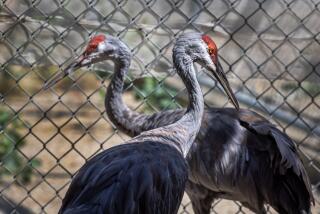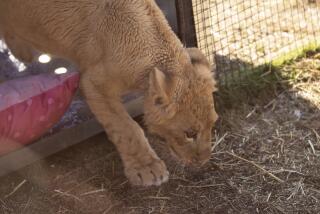A Care Package for Afghan Animals
- Share via
KABUL, Afghanistan — Marjan, the blind and crippled lion, got his first dose of deworming medicine. Samboo, the bear who was so terrified by recent bombing that he scraped off much of his nose on the bars of his cage, ate apples smeared with antibiotics.
The 28 other animals surviving in the blasted-out Kabul Zoo are in line for initial treatments over the next week, after the first international aid for them began arriving Monday.
“We are so happy” to have medicine and assistance, said the zoo’s veterinarian, 40-year-old Abdul Qadir. “Whenever the animals got hurt, we felt that pain in our own bodies. . . . We couldn’t help them.”
Marjan, especially, has become a symbol to much of the world of the miseries and violence Afghanistan has endured.
In 1993, a man demonstrating his fearlessness to friends leaped the fence and went to pet the lion, according to head zookeeper Shir Agha Omar. He did, and Marjan sat still. When the man attempted to touch Marjan’s mate, who has since died, Marjan rammed him so hard he died without ever being mauled or bitten.
The next day, the dead man’s brother came back and tossed a grenade into the lion’s pen, blinding Marjan in both eyes, mutilating his face and injuring his hind legs.
Stories and pictures of the crippled lion, sent around the world after the Taliban fled Kabul, the capital, have prompted people to donate an estimated $1 million. U.S. zookeepers and animal lovers have raised $400,000. Three British newspapers competed with one another to raise funds, believed to total in the hundreds of thousands of dollars, while groups from China, Germany, Australia and other countries also have gathered contributions.
Afghanistan has no banks, an ongoing war and rampant banditry, so the only aid that has arrived so far came over the weekend in the suitcases of John Walsh of the London-based World Society for the Protection of Animals, or WSPA.
The lion was Walsh’s first patient, the bear his second. One diminutive Afghan antelope, two porcupines, two Asian wildcats, five monkeys, eight eagles and 10 other creatures--not counting a swarm of small birds and a hutch of rabbits--are still to be treated.
The zoo had about 380 animals in the early 1990s when it first found itself on the front lines of a war among rival warlords, some of whom went on to lead the Northern Alliance. An elephant, chained to the ground, was killed when a rocket demolished its brick pen. Several ponies died in a mortar attack. Many other animals were killed as the vast majority of the zoo was leveled. Most of those that survived later perished from malnutrition and untreated illnesses.
Marjan, believed to be about 23 years old, lived, only to be maimed. On Monday, Walsh dewormed the lion, treated him with other medications and quickly laid out a plan to heat and improve his pen. The blind lion sometimes finds his way about by walking headfirst into brick walls, then turning.
After tending to Marjan, Walsh headed for the cage of Samboo, an endangered Asiatic black bear, whose nose is believed to have been first cut by a Taliban knife and then severely damaged as he dragged it along his cage’s bars during the fighting.
Studying media images of the small bear’s face, WSPA veterinarians in Europe and the U.S. concluded that the best treatment would be a skin graft. But Walsh decided that Samboo would probably rub the new skin off, and so he turned to a simpler approach: feeding the bear the medicine-laced apples and trying with limited success to lure him close enough to squirt antibiotics onto his raw snout.
“We’re going to have to come up with a different system,” Walsh said after coaxing the frightened bear with tuna but mostly missing with the antibiotic gel.
Like almost everyone in this country, the 11 workers at the zoo have not been paid in a long time, six months in most cases.
In an effort to get the rebuilding effort going, and to make sure the workers wouldn’t be tempted to take meat meant for the animals home to their families, Walsh brought along enough cash to cover the unpaid wages. The total came to $3,600.
The zookeepers and WSPA have already come up with plans for improvements, from erecting signs that instruct local children, who have grown up with war, not to throw rocks at the animals, to constructing a complete veterinary clinic. Two veterinarians from the WSPA are due to arrive today, along with about 10,000 pounds of medicine, food and supplies.
Afghanistan is only a step from renewed chaos, so the plan also calls for stockpiling high-calorie animal feed in case fighting in the southern part of the country works its way back here.
Agha Omar, the head zookeeper, has come without pay almost every day for more than eight years to feed the animals whatever food was available. No matter what the future holds, he said, he will continue.
More to Read
Sign up for Essential California
The most important California stories and recommendations in your inbox every morning.
You may occasionally receive promotional content from the Los Angeles Times.













